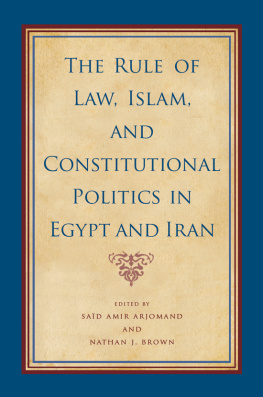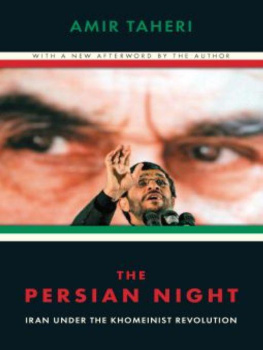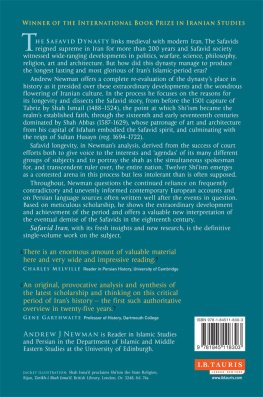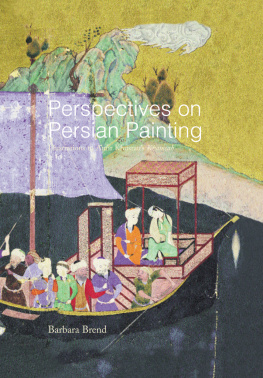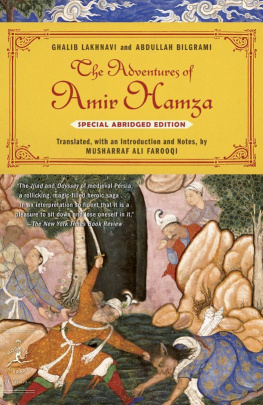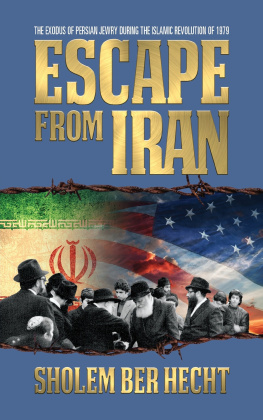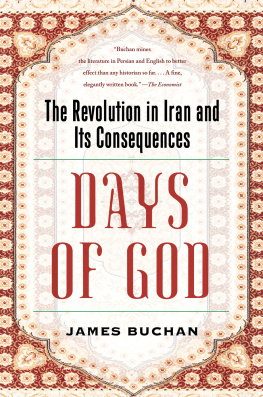Table of Contents
Praise for The Persian Night
The Persian Night is an extraordinary document filled with original ideas and interesting commentary. Yet another tour de force by the most knowledgeable analyst of Middle East politics.
Dr. Herbert London
President, Hudson Institute
Written in sorrow rather than anger, The Persian Night clearly and calmly describes Irans descent into unreality. It is a masterwork of information and argument.
David Pryce-Jones
National Review
In the overdue and necessary departure from diplomatic clichs, Amir Taheris many-layered exposition of the origins, goals and nature of a messianic regime that he convincingly dismisses as neither Islamic, nor republican, and... certainly not Iranian is an indispensable guide.
Rosemary Righter
Times Online
A brilliant journalist, Taheri, who has published ten other books on Islam, Iran and the Middle East, shows with his eleventh book that he is also a master of strategy and one of the most original thinkers about international politics today.
Elaph Online
For all its seriousness as a political study, The Persian Night is an enjoyable book written in a witty and easily accessible style.... This year, marking the thirtieth anniversary of the Khomeinist seizure of power in Tehran, has inspired dozens of books on Iran and its recent experience. Taheris book is by far one of the best both in scope and in style. A must read for all those interested in Iran, the Middle East, Islam and international politics.
Tim Connell
Asharq Alawsat
Taheris Persian Night presents the true nature of the regime in Tehran, its motives, objectives and beliefs.
James S. Robbins
New York Post
Amir Taheris new book reshapes the debate on the Iranian problem.
Andrea Keane
Iran va Jahan
Mr. Taheri explores in detail the historical, cultural, social and political roots of the Islamic Republic and the threat that he claims it poses to the West.... He raises important questions over how to accommodate a regime that openly expresses its wish to see the end of Israel and remove all Western influence from the region.
The Economist
Amir Taheri explains powerfully in The Persian Night that there is no real solution to the problem the regime presents except its collapse.
Commentary
A fascinating book.
Hugh Hewitt
Look at our times: A handful of impostor-clerics,
Having learned a couple of suras for deceit,
Having no notion of reason and science;
Unaware of what man is about;
Desperate like asses in search of fodder.
All they care about is eating and fornicating.
They fear not God, have no shame of men,
They have cast aside notions of honor.
They seek nothing but loot and plunder,
Alien they are to the rules of faith.
O, Unique Prophet of God!
For the sake of your ummah,
for the sake of Allah,
Rise from your garden tomb in Medina,
Behold who is ruling your followers.
O, Muslims! The time has come,
To send the Koran back to Heaven.
For, although its name is still with us,
Its content has come to naught.
Sanai Ghaznavi
Preface
I n Persian mythology, the fall of Jamshid, the shah of the Pishdadi dynasty, heralded the longest night in the history of the world. During that fateful night, a priest-king of Arab origin named Azidhak (Zahhak) ruled Iran on behalf of Angarmainu, the symbol of the devil for ancient Persians. Many Iranians see the Khomeinist revolution of 1979 and the regime it produced as a real-time recurrence of the legend, but hope that this new longest night will prove shorter.
This essay will examine the inner history of the Khomeinist movement and trace its ideological and cultural roots. Is it a natural offshoot of Islamwhich itself was an alien faith imposed on Iranians by the sword fourteen centuries agoor a strange beast in Islamic dress?
In recent years, especially since the election of Mahmoud Ahmadinejad as president, the Islamic Republic has positioned itself as the leader of a global jihad against the so-called infidel camp led by the United States. The low-intensity war that Khomeinism launched against the United States in 1979 has been propelled into a new phase that could lead to full-scale military confrontation. This essay shows how Khomeinism is genetically programmed for war, but also considers how it can best be resisted and ultimately defeated, so that Iran may close the chapter of revolution and return to the global mainstream as a nation-state.
The Worlds Number-One Power
S haking his clenched fist defiantly, President Mahmoud Ahmadinejad of the Islamic Republic in Iran looked as if he had a historic message to deliver during one of his trademark provincial tours in April 2008. Today, he said, everyone knows that the Islamic Republic is the number-one power in the world. We are standing up to the American Great Satan and we are not alone. His audience of grim-faced men with ferocious beards and women covered in forbidding hijabs roared in approval.
A few weeks earlier, in February, Ahmadinejad had inaugurated an international conference titled The World Without America!, attended by dozens of anti-American radicals from all over the world. Two months later, in an address marking the nineteenth anniversary of the death of Ayatollah Ruhallah Khomeini, the founder of the Islamic Republic, Ahmadinejad blamed the United States for the ills of mankind, notably the creation of Israel, and predicted the imminent demise of both. You should know that the criminal and terrorist Zionist regime which has sixty years of plundering, aggression and crimes in its file, has reached the end of its work and will soon disappear off the geographical scene, he said. As for the satanic power [the United States], the countdown to the destruction of its empire of power and wealth has begun.
Ahmadinejad and his foreign minister, Manuchehr Mottaki, routinely define their policy as one intended to create a world without America. The aim of the Khomeinist regime is to dictate the policies of the United States and of all other nations. As the many versions of anti-Americanism go, this is certainly an innovative one.
To be sure, Ahmadinejad did not invent the militant anti-Americanism that he adopted as the key theme of his presidency. nor was the claim that the United States was at war against Islam something new to Ahmadinejads audiences; he was harping on a theme they had known for almost three decades. The Islamic Republic had been at war against the Great Satan since november 4, 1979, when a group of students stormed the U.S. embassy in Tehran and held fifty-two of its diplomats hostage for 444 days. President Jimmy Carters national security advisor, Zbigniew Brzezinski, called it an act of war. The Carter administration, however, did not adopt that analysis, but tried, in a strange fit of denial, to portray the event as merely a diplomatic incident.
Carter saw Khomeini as a religious man rather than the founding father of Islamist terrorism. In a letter to Khomeini, he wrote as one man of God to another. Carters advisors mostly shared his illusions. His ambassador to the United nations, Andrew Young, hailed Khomeini as a twentieth-century saint. The U.S. ambassador to Iran, William Sullivan, saw Khomeini as a Gandhi-like figure. They were deaf to the cries of Death to America! that reverberated in Tehran, and they ignored daily calls by Khomeini to wage war against the United States. With a few honorable exceptions, American policymakers have perpetuated that denial to this day.




